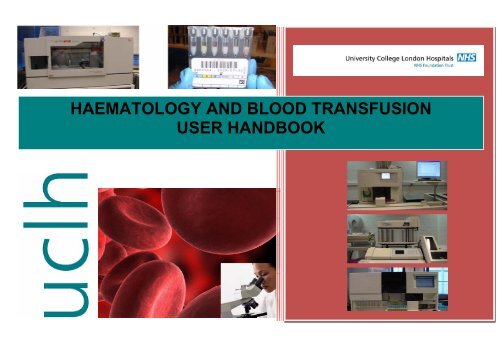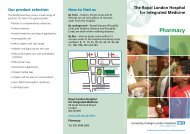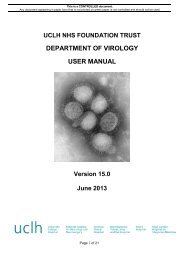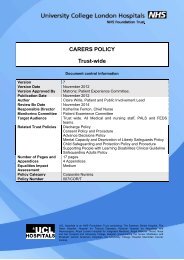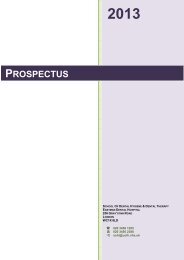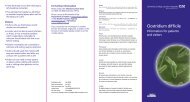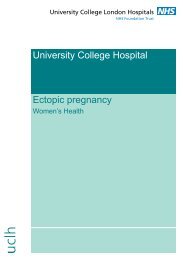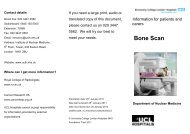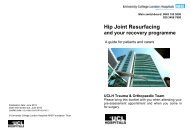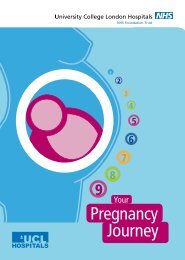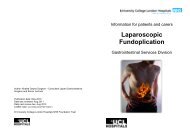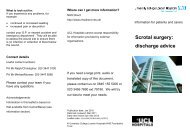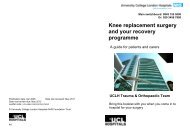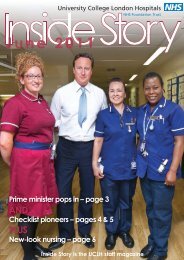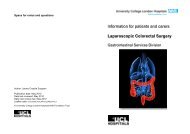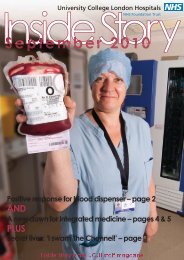haematology users' handbook - University College London Hospitals
haematology users' handbook - University College London Hospitals
haematology users' handbook - University College London Hospitals
Create successful ePaper yourself
Turn your PDF publications into a flip-book with our unique Google optimized e-Paper software.
HAEMATOLOGY AND BLOOD TRANSFUSION<br />
USER HANDBOOK
Table of Contents<br />
Table of Contents...................................................................................................................................................................................................... 2<br />
General Information .................................................................................................................................................................................................. 3<br />
Location ...........................................................................................................................................................................................................................................3<br />
Contact Numbers and Working Hours.............................................................................................................................................................................................3<br />
Urgent Requests..............................................................................................................................................................................................................................4<br />
Out-of-Hours Service (after hours Monday - Saturday, Sunday and Public Holidays). ..................................................................................................................4<br />
Medical Staff....................................................................................................................................................................................................................................5<br />
Near Patient Testing facilities (Point of Care Laboratories).............................................................................................................................................................6<br />
Phlebotomy Services .......................................................................................................................................................................................................................6<br />
Vacutainer Guide .........................................................................................................................................................................................................................7<br />
Completion of the request form .......................................................................................................................................................................................................8<br />
Sample Collection (phlebotomy)......................................................................................................................................................................................................8<br />
Sample Labelling .............................................................................................................................................................................................................................8<br />
Sample Transport to the Laboratory................................................................................................................................................................................................9<br />
Special Handling Requirements ......................................................................................................................................................................................................9<br />
Routine Haematology.............................................................................................................................................................................................. 10<br />
Blood Transfusion ................................................................................................................................................................................................... 13<br />
Routine Coagulation................................................................................................................................................................................................ 18<br />
Haemostasis ........................................................................................................................................................................................................... 20<br />
Special Haematology .............................................................................................................................................................................................. 25<br />
Flow Cytometry (HIV and Malignancy Cell Markers)............................................................................................................................................... 29<br />
Leukaemia Cytogenetics......................................................................................................................................................................................... 34<br />
HAEM-PD-UserHbook V8 Haematology and Blood Transfusion User Handbook Page 2 of 38<br />
Authors: Karen Orfinada (Senior Biomedical Scientist)<br />
Sally McDonald (Senior Biomedical Scientist) Authorised by: Dave Barnett Review Date: August 2015
General Information<br />
Location<br />
The Haematology and Blood Transfusion laboratories are located at 60 Whitfield St <strong>London</strong> W1T 4EU. Samples are sent from the main hospital to Specimen<br />
Reception via the ‘Pod’ system and sample deliveries made by courier or from other sites are made via a rear building entrance in Howland Mews. Near Patient<br />
Testing facilities for Haematology/Oncology patients are located on the Lower Ground Floor of the MacMillan Cancer Centre on Huntley Street.<br />
Contact Numbers and Working Hours<br />
Haematology General Manager 0203 44 78192 or x78192 9.00 – 17.15 Tuesday - Thursday<br />
Dave Barnett<br />
Training and Development Manager 0203 447 9887 or x79887 9.00 – 17.15 Monday - Friday<br />
Stefan Kunka<br />
Quality Compliance Coordinator 0203 447 9887 or x79887 9.00 – 17.15 Monday - Friday<br />
Susan Crouch<br />
Health & Safety Officer 0203 447 8533 or x78533 9.00 – 17.15 Monday - Friday<br />
Norma McQueen<br />
Routine Haematology & Coagulation 9.00 – 19.15 Monday – Friday<br />
9.00 – 13.30 Saturday<br />
9.00 – 13.00 Sunday<br />
Departmental Lead: Billy Janda 0203 447 8961 or 78961 9.00 – 17.15 Monday - Friday<br />
Routine Haematology & General Enquiries 0203 447 8961 or x78961<br />
Routine Coagulation 0203 447 8547 or x78547<br />
Out-of-hours Bleep 7060<br />
Blood Transfusion Laboratory 0203 447 8522/8523 or x78522/78523 9.00 – 19.15 Monday – Friday<br />
Out-of-hours Bleep 7060 9.00 – 13.30 Saturday<br />
9.00 – 13.00 Sunday<br />
Departmental Lead: Jenny Berryman 0203 447 8522/8523 or x78522/78523 9.00 – 17.15 Monday - Friday<br />
Blood Transfusion Training and Compliance Officer: Sangeeta Samuel 0203 447 8522/8523 or x78522/x78523 9.00 – 17.15 Monday – Friday<br />
MAJOR HAEMORRHAGE<br />
HAEM-PD-UserHbook V8 Haematology and Blood Transfusion User Handbook Page 3 of 38<br />
Authors: Karen Orfinada (Senior Biomedical Scientist)<br />
Sally McDonald (Senior Biomedical Scientist) Authorised by: Dave Barnett Review Date: August 2015
For a Major Haemorrhage at any time: dial telephone extension 2222 (or extension 32222 from the Heart Hospital) and state "Major Haemorrhage" to the<br />
switchboard operator to activate the UCLH Trust’s Major Haemorrhage Protocol. In the event of a telephone network failure: dial the Analogue Direct Telephone<br />
Line to Blood Transfusion *020 7 631 0267, or Emergency Mobile *0771 851 2912.<br />
Note, these telephone numbers are for emergency use only: any use of these lines for routine communication will be reported as a clinical incident.<br />
Haemostasis Laboratory (Specialised Coagulation) 0203 447 8549/8529 or x78549/78529 9.00 – 17.15 Monday – Friday<br />
Departmental Lead: Pamela Carr 0203 447 8545 or x78545<br />
Special Haematology (Haemoglobinopathies) 0203 447 8533 or x78533 9.00 – 17.15 Monday – Friday<br />
Departmental Lead: Norma McQueen<br />
Flow Cytometry (HIV and malignancy cell markers) 0203 447 9603 or 79603 9.00 – 17.15 Monday – Friday<br />
Departmental Lead: Naina Chavda 0203 447 8541 or x78541<br />
A limited Leukaemia Immunophenotyping service is available out-of-hours (subject to authorisation by a Haematology Consultant).<br />
;<br />
Leukaemia Cytogenetics 0203 447 9603 or 79603 9.00 – 17.15 Monday – Friday<br />
Samples are forwarded from the Flow Cytometry laboratory to external reference laboratories. Returned reports are scanned onto CDR.<br />
Urgent Requests<br />
Please contact the relevant laboratory during routine working hours, or Bleep 7060 outside routine working hours to alert laboratory staff to samples en route for<br />
urgent processing.<br />
Out-of-Hours Service (after hours Monday - Saturday, Sunday and Public Holidays).<br />
The Haematology Laboratory provides a 7 day / 24 hour restricted service outside of routine hours: a Biomedical Scientist can be contacted via the relevant<br />
Routine Haematology, Routine Coagulation or Blood Transfusion laboratory telephone extension number until 19.15 (see above), or via Bleep 7060 at any time.<br />
The following services are available out of routine working hours:<br />
• Full Blood Count (FBC), Erythrocyte Sedimentation Rate (ESR), Blood Film Examination, Malaria antigen testing.<br />
• Clotting Screen / Fibrinogen Assay / D-Dimers<br />
• Group and Antibody Screen for Pre-op/Crossmatch<br />
• Crossmatch<br />
• Pre-op sickle testing<br />
Bleep 7060 to discuss any urgent requests for any services that are not usually available out of routine working hours.<br />
HAEM-PD-UserHbook V8 Haematology and Blood Transfusion User Handbook Page 4 of 38<br />
Authors: Karen Orfinada (Senior Biomedical Scientist)<br />
Sally McDonald (Senior Biomedical Scientist) Authorised by: Dave Barnett Review Date: August 2015
Medical Staff<br />
Consultants<br />
Dr Marie Scully (Lead Clinician) 020 7025 7970 or 020 3447 9884 Email: nancy.moorcraft@uclh.nhs.uk<br />
Dr Kirit Ardeshna 020 3447 9443 or ext 79443 Fax: 020 3447 9911 Email: melissacrozier@uclh.nhs.uk<br />
Dr Hannah Cohen (via secretary) 020 3447 8563 or ext 78563 Email: christine.smith@uclh.nhs.uk<br />
Dr Bernard Davis 020 3447 9638 or ext 78538 Email: sarah.benn-hirsch@uclh.nhs.uk<br />
Dr Shirley D’Sa 020 3447 8028 or ext 78028 Fax: 020 3447 9911 Email: shirley.dsa@unclh.nhs.uk<br />
Dr Victoria Grandage 020 3447 5239 or ext 75239 Fax: 020 3447 5827<br />
Dr Rajeev Gupta 020 3447 8483 or ext 78483 Email: anne.evans@uclh.nhs.uk<br />
Dr Jonathan Lambert 020 3447 9443 or ext 79443 Email: melissa.crozier@uclh.nhs.uk<br />
Dr Emma Morris 020 3447 9712 or ext 79712 Fax: 020 3447 9571 Email: e.morris@medsch.ucl.ac.uk<br />
Dr Ri Liesner 020 3447 9884 or ext 79884 Email: nancy.moorcraft@uclh.nhs.uk<br />
Dr Karl Peggs 020 3447 9712 or ext 79712 Fax: 020 3447 9571 Email: k.peggs@ucl.ac.uk<br />
Dr Martin Pule 020 3447 8483 or ext 78483 Email: anne.evans@uclh.nhs.uk<br />
Dr Neil Rabin 020 3447 8028 or ext 78028 Email: ysabel.howard@uclh.nhs.uk<br />
Dr Farrukh Shah 020 3447 9638 or ext 79638 Email: sarah.benn-hirsh@uclh.nhs.uk<br />
Dr Kirsty Thomson 020 3447 9712 or ext 79712 Fax: 020 3447 9571 Email: suzie.knapton’uclh.nhs.uk<br />
Dr Sara Trompeter 020 3447 9638 or ext 79638 Fax: 020 3447 9911 Email: sarah.benn-hirsch@uclh.nhs.uk<br />
Dr Andres Virchis 020 3447 9712 or ext 79712 Email: suzie.knapton@uclh.nhs.uk<br />
Professor Anthony Glodstone 020 3447 1528 or ext 71528 Email: Anthony.goldstone@uclh.nhs.uk<br />
Professor Asim Khwaia 020 7679 6554 or ext 79456 Fax: 020 3447 9911 Email: joan.hammond@uclh.nhs.uk<br />
Professor David C Linch 020 3447 8483 or ext 78483 Fax: 020 3447 9911 Email: Melissa.crozier@uclh.nhs.uk<br />
Professor Stephen Mackinnon 020 3447 9712 or ext 79884 Email: s.mackinnon@ucl.ac.uk<br />
Professor John B Porter 020 3447 9638 or ext 79638 Email: sarah.benn-hirsch@uclh.nhs.uk<br />
Prof Kwee L Yong 020 3447 8028 or ext 78028 Fax: 020 3447 9911 Email: ysabel.howard@uclh.nhs.uk<br />
Dr. John Paul Westwood 0203 447 6854 or 020 3447 9884 or ext 79884 Email: nancy.moorcraft@uclh.nhs.uk<br />
Specialist Registrars (9.00 – 17.00 Monday – Friday)<br />
Haematology Laboratory SpR Bleep 7000<br />
Blood Transfusion Laboratory SpR Bleep 7050<br />
Haemostasis Laboratory SpR Bleep 7044<br />
On-call Haematology Registrar/SpR (out-of-hours) Contact via Switchboard<br />
Clinical advice<br />
During routine working hours (Monday – Friday 9.00 – 17.00), please contact the relevant laboratory Specialist Registrar via the bleep system.<br />
A Haematology Registrar/SpR is on call outside routine working hours: contact via the switchboard.<br />
HAEM-PD-UserHbook V8 Haematology and Blood Transfusion User Handbook Page 5 of 38<br />
Authors: Karen Orfinada (Senior Biomedical Scientist)<br />
Sally McDonald (Senior Biomedical Scientist) Authorised by: Dave Barnett Review Date: August 2015
Near Patient Testing facilities (Point of Care Laboratories)<br />
Haematology Point of Care Laboratories provide Full Blood Count results exclusively for Haematology/Oncology outpatients receiving chemotherapy or<br />
attending clinic appointments.<br />
MacMillan Cancer Centre (Huntley Street), Lower Ground Floor 0203 447 6855 or extension 76855 8.00 – 17.00 Monday-Friday<br />
Phlebotomy Services<br />
Phlebotomy Manager: Nahid Weaver 0203 447 0168 or x70168 7.30 – 16.30 Monday – Friday<br />
Inpatient Services<br />
<strong>University</strong> <strong>College</strong> Hospital<br />
Monday to Sunday 08:00 – 12:00 *<br />
Heart Hospital<br />
Monday to Sunday 08:00 – 12:00 *<br />
National Hospital for Neurology and<br />
Neurosurgery (NHNN) Inpatients<br />
Monday to Friday 08:00 – 12:00 *<br />
* Note: Outside of these hours, staff trained in phlebotomy<br />
must collect blood samples.<br />
Elizabeth Garrett Anderson wing (EGA)<br />
No inpatient service<br />
GP Service<br />
UCLH GP Blood Test Suite<br />
2 nd Floor, Mortimer Market Centre,<br />
Mortimer Market WC1E 6JB<br />
Mortimer Market runs off Capper Street, which is a side<br />
street off Tottenham Court Road (across from Howland<br />
Street).<br />
Monday to Friday 07:30 - 16:30<br />
Outpatient Services<br />
<strong>University</strong> <strong>College</strong> Hospital,<br />
1 st Floor Podium<br />
Monday, Tuesday, Thursday, Friday 08.30 – 16.30<br />
Wednesday 08.30 – 19.00<br />
Saturday, Sunday Closed<br />
Antenatal Clinic- UCH EGA wing<br />
(1 st Floor)<br />
Monday, Wednesday, Thursday 09:00 – 17:00<br />
Tuesday 09:00 – 13:00<br />
Friday, Saturday, Sunday Closed *<br />
(*samples collected by ANC staff).<br />
National Hospital for Neurology and<br />
Neurosurgery (NHNN) Outpatients<br />
Monday, Tuesday, Thursday, Friday 09:00 – 16:45<br />
Wednesday 09:00 – 18:00<br />
Saturday, Sunday Closed<br />
5 th Floor, Rosenheim Building<br />
Monday, Tuesday, Wednesday 08:30 – 16:45<br />
Thursday, Friday 08:30 – 16:30<br />
Saturday, Sunday Closed<br />
Diabetic Clinic (UCH Podium, 1 st Floor)<br />
Monday * 13:00 – 17:00<br />
• Clinics held every 2 nd Monday only<br />
(appointments arranged by Diabetic Clinic<br />
staff).<br />
Thursday 08:30 – 17:00<br />
Travel Clinic<br />
2 nd Floor, Mortimer Market Centre,<br />
Mortimer Market WC1E 6JB<br />
Mortimer Market runs off Capper Street,<br />
which is a side street off Tottenham Court<br />
Road (across from Howland Street).<br />
Monday – Friday 09:00 -16:30<br />
Appointment Wednesdays 13:00 -17:00<br />
Fridays 09:00 -13:00<br />
Saturday, Sunday Closed<br />
HAEM-PD-UserHbook V8 Haematology and Blood Transfusion User Handbook Page 6 of 38<br />
Authors: Karen Orfinada (Senior Biomedical Scientist)<br />
Sally McDonald (Senior Biomedical Scientist) Authorised by: Dave Barnett Review Date: August 2015
Vacutainer Guide<br />
Becton Dickinson<br />
Vacutainer <br />
Note : underfilled samples<br />
are unsuitable for testing.<br />
Ordering<br />
Information<br />
EDTA<br />
4.5 ml<br />
Sodium citrate (citrated<br />
tube)<br />
4.5 ml<br />
SST<br />
5ml<br />
Lithium Heparin<br />
4.5 ml<br />
Sodium citrate (citrate)<br />
1.0 ml<br />
Tests / Screens<br />
FBC, ESR, Reticulocyte count, IPF, Blood film (note: ESRs cannot be performed on 7ml EDTA tubes),<br />
Sickle screen, Malaria Antigen testing<br />
Glandular Fever testing (note, Glandular Fever testing can be performed on an SST sample),<br />
Lymphocyte subsets (including CD4, CD8 counts), Hereditary Spherocytosis Dye binding assay,<br />
Plasma Viscosity, PCR in Haemostasis<br />
Blood Transfusion<br />
*Group & Save (including antibody screen), *Crossmatch, Kleihauer, DAT<br />
*Sample identification for Group & Screen or Crossmatch MUST be hand written with 4 correct points of ID.<br />
Clotting screen / Fibrinogen / D-Dimers. These tubes must be filled exactly to the 4.5ml mark on the side of<br />
the tube: underfilled & overfilled samples are unsuitable for testing.<br />
For Paediatric Clotting Screens, see below.<br />
Citrated Platelet Count (alert Coagulation laboratory staff that the sample is en route: it must not be<br />
centrifuged).<br />
Specialised Haemostasis tests must be authorised by a Haematology/Haemostasis SpR/Consultant<br />
See the Haemostasis section below for the samples required for specialised Haemostasis tests.<br />
Cardiolipin antibodies (Antiphospholipid antibodies)<br />
β 2 GPI antibodies<br />
Haemoglobinopathy screen, G6PD assay, Pyruvate Kinase assay, Red Cell Osmotic Fragility, Globin Chain<br />
Biosynthesis, Oxygen Dissociation curve<br />
Cytogenetic chromosomal analysis and FISH.<br />
Paediatric Clotting Screen, Fibrinogen, D-Dimers (1ml tubes).<br />
Contact the Haemostasis laboratory for other Haemostasis tests for paediatric patients.<br />
These tubes must be filled exactly to the 1ml mark on the side of the tube: underfilled & overfilled samples<br />
are unsuitable for testing.<br />
These tubes are issued from the Haemostasis Laboratory to the Neonatal Unit, Paediatric A&E and<br />
Phlebotomy Outpatient Departments and can be issued to other locations on request: contact x78549 or<br />
x78545. Monday – Friday 09.00 – 17.15<br />
HAEM-PD-UserHbook V8 Haematology and Blood Transfusion User Handbook Page 7 of 38<br />
Authors: Karen Orfinada (Senior Biomedical Scientist)<br />
Sally McDonald (Senior Biomedical Scientist) Authorised by: Dave Barnett Review Date: August 2015
Completion of the request form<br />
Please use the appropriate request form for the tests required and ballpoint (indelible) ink pen to complete the form.<br />
• Please provide the patient’s full name, hospital number and date of birth.<br />
• Please provide the date and time of sample collection and relevant clinical information to facilitate sample processing and the interpretation of results.<br />
• Please use a separate Blood Transfusion request form for Blood Transfusion requests; Group & Save, Crossmatch, Kleihauer, DAT.<br />
• Please ensure that the destination of the report, the name of the requesting/responsible clinician and a contact bleep/telephone number for the<br />
responsible clinician is provided to enable laboratory staff to notify the clinician regarding unsuitable (urgent) samples and to relay and/or discuss urgent<br />
or grossly abnormal results.<br />
• Please tick the box next to the test(s) requested; if a required test is not listed, write it clearly into the “Additional Tests” section.<br />
• Please tick the appropriate box when the patient is anticoagulated (on warfarin or heparin).<br />
• If possible please provide clinical details.<br />
Please ensure that adequate samples are taken for the tests requested and that each sample is labelled correctly. Contact the relevant laboratory for clarification<br />
of sample requirements if required.<br />
Sample Collection (phlebotomy)<br />
The sample collection policy for staff trained in phlebotomy [Haem-PD-BloodSampColl] and guidelines for sample labelling are available on the UCLH Intranet<br />
and can be sent electronically to GP practices.<br />
Sample Labelling<br />
• Please label samples clearly with hospital number, first and last name and date of birth using a ballpoint (permanent/indelible) ink pen. The NHS number<br />
may be used in place of the hospital number for GP and non-UCLH Trust patients.<br />
• Samples for a Group and Save (including an antibody screen) and Crossmatching must be hand written with four correct points of ID. Please include the<br />
time and date of collection and the signature of the person collecting the sample.<br />
• A minimum of three points of identification must be provided for all other samples.<br />
NOTE: Samples received broken/leaking, inadequately labelled, aged, clotted, haemolysed or otherwise unsuitable for testing will not be processed; an<br />
appropriate comment will be entered onto the computer system. If the requested tests are urgent, laboratory staff will attempt to notify the ward/clinician.<br />
HAEM-PD-UserHbook V8 Haematology and Blood Transfusion User Handbook Page 8 of 38<br />
Authors: Karen Orfinada (Senior Biomedical Scientist)<br />
Sally McDonald (Senior Biomedical Scientist) Authorised by: Dave Barnett Review Date: August 2015
Sample Transport to the Laboratory<br />
UCLH samples: refer to the Pathology Specimen Transport and Pneumatic Tube System policies on the UCLH Intranet for hospital transport. Samples from GP<br />
practices must be sent via UCLH Trust transport; via the next available collection during the working day. If a significant delay in sample transportation to the<br />
laboratory is anticipated, please discuss with laboratory staff, as sample deterioration may limit the viability of results.<br />
Special Handling Requirements<br />
Please see the ‘Notes’ section in the test tables below, or contact the relevant laboratory for information regarding special handling requirements.<br />
HAEM-PD-UserHbook V8 Haematology and Blood Transfusion User Handbook Page 9 of 38<br />
Authors: Karen Orfinada (Senior Biomedical Scientist)<br />
Sally McDonald (Senior Biomedical Scientist) Authorised by: Dave Barnett Review Date: August 2015
Routine Haematology (page 1 of 3)<br />
Autolab. 1 st Floor, Whitfield St Laboratories, 60 Whitfield St <strong>London</strong> W1T 4EU 0203 447 8961 or x78961 (Haematology) Bleep 7060 (out-of-hours)<br />
0203 447 8547 or x78547 (Routine Coagulation)<br />
• Please contact the laboratory for reference range(s) if not listed below:<br />
Test<br />
Acanthocytes<br />
Specimen<br />
Type<br />
4.5ml EDTA<br />
(can be<br />
performed on<br />
same sample as<br />
FBC)<br />
Reference<br />
ranges<br />
Key Factors<br />
affecting tests<br />
0-3 % Delay in receiving<br />
sample<br />
Sample not kept at<br />
room temperature<br />
Notes<br />
Send sample ASAP to the<br />
laboratory as prolonged<br />
storage affects cell<br />
morphology<br />
Out of<br />
hours<br />
service<br />
No<br />
service<br />
provided<br />
Time Limit for<br />
requesting<br />
additional<br />
tests from<br />
time of<br />
venesection<br />
Within 24<br />
hours<br />
Turnaround time<br />
from receipt of<br />
sample<br />
12 hrs<br />
Blood Film<br />
Citrated Platelet<br />
Count (platelet<br />
clumping in EDTA)<br />
ESR<br />
4.5ml EDTA<br />
(can be<br />
performed on<br />
same sample as<br />
FBC)<br />
4.5ml Sodium<br />
Citrate<br />
4.5ml EDTA<br />
(can be<br />
performed on<br />
same sample as<br />
FBC)<br />
Not applicable<br />
Delay in receiving<br />
sample<br />
Sample not kept at<br />
room temperature<br />
Send sample ASAP to the<br />
laboratory as prolonged<br />
storage affects cell<br />
morphology.<br />
Please give clinical details<br />
/ reason for request<br />
150-400 x10 9 /l Clot in sample Please indicate clearly on<br />
the request form that<br />
sample is for a citrated<br />
platelet count. Notify the<br />
Routine Coagulation<br />
Laboratory that the sample<br />
is en-route: do not<br />
centrifuge the sample.<br />
3mls.<br />
Cannot be performed on a<br />
7ml EDTA tube.<br />
Service<br />
for<br />
clinically<br />
urgent<br />
requests<br />
Service<br />
for<br />
clinically<br />
urgent<br />
requests<br />
Service<br />
for<br />
clinically<br />
urgent<br />
requests<br />
Within 24<br />
hours<br />
Within 24<br />
hours<br />
Within 24<br />
hours<br />
Urgent:<br />
4hrs (not<br />
out of hours<br />
unless the<br />
laboratory<br />
is<br />
contacted)<br />
8 hrs<br />
Urgent<br />
Nonurgent<br />
24 hrs<br />
Nonurgent<br />
2 hrs 24 hrs<br />
HAEM-PD-UserHbook V8 Haematology and Blood Transfusion User Handbook Page 10 of 38<br />
Authors: Karen Orfinada (Senior Biomedical Scientist)<br />
Sally McDonald (Senior Biomedical Scientist) Authorised by: Dave Barnett Review Date: August 2015
Routine Haematology (page 2 of 3)<br />
Test Specimen Type Reference<br />
ranges<br />
Fluid Count<br />
(e.g. Pleural,<br />
Ascitic, Knee fluid)<br />
Full Blood Count<br />
(FBC)<br />
Glandular Fever<br />
Screen<br />
Fluid to be<br />
taken into EDTA<br />
or 10 or 20ml<br />
sterile container<br />
4.5ml EDTA<br />
4.5ml EDTA<br />
Can be performed<br />
on FBC sample<br />
or a 4.5 / 7ml<br />
clotted sample<br />
Adult WBC:<br />
3-10 x10 9 l<br />
Neutrophils:<br />
2-7.5 x10 9 /l<br />
Haemoglobin:<br />
11.5-15.5g/dl (F)<br />
13-17 g/dl (M)<br />
MCV: 80-99 fl<br />
Platelets:<br />
150-400 x10 9 /l<br />
Key Factors<br />
affecting tests<br />
Delay in receiving<br />
sample<br />
Clot in sample<br />
Insufficient,<br />
Lipaemic or<br />
Icteric samples<br />
Delayed sample<br />
receipt<br />
Clot in sample<br />
Notes<br />
Please use “Urine/other”<br />
request form-specify type of<br />
fluid<br />
> 1ml blood required<br />
Sample must be received<br />
within 12 hrs of collection<br />
Lipaemic/icteric samples can<br />
affect performance of test and<br />
may delay results<br />
Test can be added on to<br />
existing FBC sample (time<br />
limit: 7 days)<br />
Out of<br />
hours<br />
service<br />
Service for<br />
clinically<br />
urgent<br />
requests<br />
Service for<br />
clinically<br />
urgent<br />
requests<br />
No service<br />
provided<br />
Time Limit for<br />
requesting<br />
additional<br />
tests from<br />
time of<br />
venesection<br />
Within 24<br />
hours<br />
Sample must<br />
be received in<br />
the laboratory<br />
within 12<br />
hours of<br />
collection<br />
Within 7 days<br />
Turnaround time<br />
from receipt of<br />
sample<br />
4 hrs<br />
Urgent:<br />
1 hr<br />
Urgent:<br />
2 hrs<br />
Nonurgent:<br />
8 hrs<br />
Nonurgent:<br />
24 hrs<br />
Immature Platelet<br />
Fraction<br />
Malaria Antigen<br />
Test<br />
4.5ml EDTA<br />
Can be performed<br />
on FBC sample<br />
4.5ml EDTA<br />
Can be performed<br />
on FBC sample)<br />
Clot in sample<br />
Delayed sample<br />
receipt<br />
Clot in sample<br />
Test can be added on to<br />
existing FBC sample<br />
All samples for malaria<br />
antigen tests are referred to<br />
Parasitology for confirmation<br />
-Please send requests for<br />
malaria parasite films and<br />
% parasitaemia directly to<br />
Parasitology laboratory<br />
Service for<br />
clinically<br />
urgent<br />
requests<br />
Service for<br />
clinically<br />
urgent<br />
requests<br />
Within 24<br />
hours<br />
8 hrs<br />
Urgent:<br />
1hr<br />
Nonurgent:<br />
8 hrs<br />
HAEM-PD-UserHbook V8 Haematology and Blood Transfusion User Handbook Page 11 of 38<br />
Authors: Karen Orfinada (Senior Biomedical Scientist)<br />
Sally McDonald (Senior Biomedical Scientist) Authorised by: Dave Barnett Review Date: August 2015
Routine Haematology (page 3 of 3)<br />
Reticulocytes<br />
Sickle Screen<br />
Test Specimen Type Reference<br />
ranges<br />
4.5ml EDTA<br />
Can be performed<br />
on FBC sample<br />
4.5ml EDTA<br />
(can be<br />
performed on<br />
same sample as<br />
FBC)<br />
Key Factors<br />
affecting tests<br />
20-100 x 10 9 /l Clot in sample<br />
Delayed sample<br />
receipt<br />
Samples from<br />
children < 6<br />
months old can<br />
give false negative<br />
results<br />
Notes<br />
Test can be added on to<br />
existing FBC sample (time<br />
limit: 24 hours)<br />
All samples for sickle screens<br />
are referred to Special<br />
Haematology for confirmation<br />
(if not previously confirmed)<br />
Out of<br />
hours<br />
service<br />
No service<br />
provided<br />
Service for<br />
clinically<br />
urgent<br />
requests<br />
Time Limit<br />
for<br />
requesting<br />
additional<br />
tests from<br />
time of<br />
venesection<br />
Within 24<br />
hours<br />
Within 7 days<br />
Turnaround time<br />
from receipt of<br />
sample<br />
8 hrs<br />
Urgent:<br />
1hr<br />
Nonurgent:<br />
24 hrs<br />
Anaemia<br />
Clot in sample<br />
Referral Laboratory (Malaria testing)<br />
Parasitology Laboratory<br />
Hospital for Tropical Diseases Building<br />
Capper St<br />
<strong>London</strong> WC1E 6JA<br />
0845 155 5000 ext 75418<br />
HAEM-PD-UserHbook V8 Haematology and Blood Transfusion User Handbook Page 12 of 38<br />
Authors: Karen Orfinada (Senior Biomedical Scientist)<br />
Sally McDonald (Senior Biomedical Scientist) Authorised by: Dave Barnett Review Date: August 2015
Blood Transfusion (page 1 of 5)<br />
1 st Floor, 60 Whitfield St <strong>London</strong> W1T 4EU 0203 447 8522 / 8523 or x78522 / 78523 (Routine hours) Bleep 7060 out-of-hours<br />
MAJOR HAEMORRHAGE (see page 4 of this user manual)<br />
• Samples and form MUST carry full and correct patient identification, i.e. handwritten forename, surname, date of birth and hospital number - requests<br />
made without these details will not be accepted.<br />
• Forms must be signed by both the requesting medical officer and the phlebotomist. The phlebotomist must sign and date the sample. Please provide a<br />
bleep number for enquiries.<br />
• Please refer to the Trust Blood Component Transfusion Policy and Procedure available on the UCLH Intranet.<br />
Test<br />
Crossmatch<br />
Specimen<br />
type<br />
4.5ml/7ml<br />
EDTA<br />
Key Factors affecting<br />
tests<br />
Incorrectly labelled,<br />
Insufficient, clotted and<br />
haemolysed samples will<br />
be rejected.<br />
Notes<br />
Contact laboratory to check whether<br />
valid Group & Save available in<br />
laboratory before sending sample.<br />
> 2ml required for adults<br />
>1ml required for neonates (
Blood Transfusion (page 2 of 5)<br />
Test<br />
Direct<br />
Antiglobulin<br />
Test (DAT)<br />
Group & Save<br />
Specimen<br />
type<br />
4.5 /7ml<br />
EDTA<br />
4.5/7ml<br />
EDTA<br />
Key Factors affecting<br />
tests<br />
Insufficient, clotted and<br />
haemolysed samples will<br />
be rejected.<br />
Kleihauer 4.5ml EDTA Delay in receiving sample.<br />
Sample not kept at room<br />
temperature before<br />
performing test.<br />
Notes<br />
Can be added onto existing Group &<br />
Save or Haematology FBC sample<br />
>2ml required for adults<br />
>1ml required for neonates (
Blood Transfusion (page 3 of 5)<br />
Test<br />
HLA typing<br />
Specimen<br />
type<br />
7-10ml EDTA<br />
(if white cell count<br />
Blood Transfusion (page 4 of 5)<br />
Transport of Routine Blood and Blood Products<br />
Remote issue of red cells has been implemented at UCLH. This allows blood to be issued directly from the Remote Issue blood fridge at the point of care, rather<br />
than from the laboratory for most patients.<br />
A small percentage of patients will still need blood crossmatched by the laboratory but this can also be stored in the remote issue blood fridge and dispensed<br />
when required.<br />
FFP for patients will be sent to remote issue fridges by the laboratory and dispensed in the same way.<br />
Cross matched blood for patients with special requirements and those not eligible for remote issue and other blood products are dispatched as follows:<br />
• Non-urgent blood and blood products are dispatched from the laboratory at various times during the day.<br />
• Urgent blood and blood products are dispatched from the laboratory by courier (arranged by the laboratory). PLEASE CONTACT THE LABORATORY<br />
(x78523/78522 during routine work hours or Bleep 7060 out of hours) IF BLOOD IS REQUIRED URGENTLY.<br />
• FFP will be returned to the laboratory 24 hours after it has been thawed.<br />
• Unused platelets/FFP/Cryoprecipitate are withdrawn the day after the original date required<br />
• Cryoprecipitate should be used within 4 hours of thawing and any remaining units returned to the lab.<br />
*Always ring the laboratory before use of EMERGENCY UNCROSSMATCHED BLOOD*<br />
HAEM-PD-UserHbook V8 Haematology and Blood Transfusion User Handbook Page 16 of 38<br />
Authors: Karen Orfinada (Senior Biomedical Scientist)<br />
Sally McDonald (Senior Biomedical Scientist) Authorised by: Dave Barnett Review Date: August 2015
Blood Transfusion (page 5 of 5)<br />
Guidelines for Clinical Situations<br />
1. Life threatening haemorrhage (acute massive blood loss) Massive obstetric haemorrhage<br />
Refer to the Major Haemorrhage Algorithm<br />
http://insight/departments/MedicineBoard/Pathology/HaematologyPathology/BloodTransfusion/Documents/Major%20haemorrhage%20algorithm.pdf<br />
For further Information refer to the Trust Major Haemorrhage Protocol<br />
http://insight/guidelines/Clinical%20guidelines/Major%20Haemorrhage%20Protocol%202012.pdf<br />
2. Non-acute bleeding and neonatal surgery<br />
Obtain:<br />
Contact:<br />
Coagulation screen and FBC<br />
Blood Transfusion Registrar<br />
Monday →Friday 09:00-17:00:<br />
UCLH Bleep 7050/7000<br />
All other times:<br />
General Haematology Registrar via UCLH switchboard<br />
Discuss:<br />
Appropriate treatment<br />
(If a high risk procedure, or the patient has a known coagulation abnormality, contact the Haemostasis Registrar prior to<br />
procedure and discuss the patient’s management)<br />
Monday →Friday 09:00 – 17:00<br />
All other times:<br />
Haemostasis Registrar UCH Bleep 7044/7000<br />
General Haematology Registrar via UCH Switchboard<br />
3. Indications for the transfusion of red cells, FFP, cryoprecipitate and platelets<br />
Please refer to the relevant chapter/appendix in the Trust Blood Component Transfusion Procedure Manual<br />
http://insight/guidelines/Clinical%20guidelines/Blood%20Transfusion%20Manual%202012.pdf<br />
4. Patients with Special Transfusion Requirements<br />
For patients who may require CMV negative blood products, Irradiated blood products, Washed red cells and/or HLA matched platelets:<br />
Please refer to the relevant appendix in the Blood Component Transfusion Procedure Manual. Ensure that the laboratory has received a Blood<br />
Transfusion Status Form by emailing BT Status or by faxing to fax number 0203 447 9587 before requesting blood products (this form can be downloaded<br />
from the Blood Transfusion site on the UCLH intranet).<br />
HAEM-PD-UserHbook V8 Haematology and Blood Transfusion User Handbook Page 17 of 38<br />
Authors: Karen Orfinada (Senior Biomedical Scientist)<br />
Sally McDonald (Senior Biomedical Scientist) Authorised by: Dave Barnett Review Date: August 2015
Routine Coagulation (page 1 of 2)<br />
Autolab 1 st Floor, Whitfield St Laboratories, 60 Whitfield St <strong>London</strong> W1T 4EU Tel: 0203 447 8547 or x 78547<br />
• Citrated samples must be adequately filled (a 9:1 blood:citrate sample ratio is required for all citrated samples). Tests cannot be performed on underfilled,<br />
overfilled, haemolysed or clotted samples.<br />
• Paediatric citrated tubes are issued from the Haemostasis Laboratory to the Neonatal Unit, Paediatric A&E and Phlebotomy Outpatient departments and<br />
can be issued to other locations on request: contact x78549/78545 during routine hours.<br />
• Include clinical details on the request form, e.g. “patient receiving Warfarin/Heparin therapy” or “post op”; to facilitate appropriate testing and<br />
interpretation of results.<br />
• Send the request form and sample to the laboratory as rapidly as possible; notify the laboratory regarding very urgent requests on ext 78547 (during<br />
routine working hours) or Bleep 7060 (out of hours).<br />
• Grossly lipaemic samples may require manual testing, potentially delaying results.<br />
• Abnormal results that require further laboratory investigation and/or manual testing/confirmation may be delayed.<br />
Test<br />
Coagulation<br />
screen<br />
PT/INR, APTT,<br />
TT, Fibrinogen<br />
Specimen<br />
type<br />
4.5ml Sodium<br />
Citrate<br />
Key Factors<br />
affecting tests<br />
Heparin &<br />
Warfarin.<br />
Delayed receipt of<br />
sample.<br />
May not be<br />
possible on<br />
grossly lipaemic<br />
samples.<br />
Note Reference Range Out of hours<br />
service<br />
Heparin & warfarin<br />
therapy affects results<br />
and determines<br />
appropriate testing<br />
please indicate that the<br />
patient is on heparin<br />
and/or warfarin on the<br />
request form.<br />
PT: 10-12 secs<br />
APTT: 25-37 secs<br />
TT: 15.5-18.5 secs<br />
Fib: 1.5 – 4.0 g/L<br />
Service for<br />
clinically urgent<br />
requests<br />
Time Limit<br />
for<br />
requesting<br />
additional<br />
tests from<br />
time of<br />
venesection<br />
5 hours Urgent:<br />
1hr<br />
Turnaround time<br />
from receipt of<br />
sample<br />
Nonurgent:<br />
4 hrs<br />
HAEM-PD-UserHbook V8 Haematology and Blood Transfusion User Handbook Page 18 of 38<br />
Authors: Karen Orfinada (Senior Biomedical Scientist)<br />
Sally McDonald (Senior Biomedical Scientist) Authorised by: Dave Barnett Review Date: August 2015
Routine Coagulation (page 2 of 2)<br />
D-dimers<br />
Test<br />
(Unfractionated)<br />
Heparin<br />
Monitoring: APTT<br />
ratio<br />
Specimen<br />
type<br />
4.5ml<br />
Sodium<br />
Citrate<br />
4.5ml Sodium<br />
Citrate<br />
Key Factors<br />
affecting tests<br />
Delayed receipt of<br />
sample.<br />
Note Out of hours<br />
service<br />
This test can be added<br />
for an existing citrated<br />
sample.<br />
Please indicate Heparin<br />
therapy on the request<br />
form (tick box or<br />
handwrite).<br />
Normal cut off:<br />
0 – 0.55 mg/L FEU<br />
DVT/PE cut off:<br />
Haemostasis (page 1 of 6)<br />
2 nd Floor, 60 Whitfield St <strong>London</strong> W1T 4EU Hours: 09.00 – 17.15 Monday - Friday Tel: 0203 447 8545 / 8549, x78545 / 78549<br />
All Haemostasis tests must be requested/authorised by the Haemostasis SpR (Bleep 7044), Haematology SpR (Bleep 7000) or Haematology Consultant, with<br />
the exception of the following:<br />
• Cardiolipin Antibody testing;<br />
• Plasma Viscosity measurement;<br />
• Thrombophilia Screens from the Hyper Acute Stroke Unit (HASU) and the National Hospital for Neurology and Neurosurgery;<br />
• Antiphospholipid Antibody Screens from Rheumatology Outpatients (Professor Isenberg’s Clinic).<br />
Please discuss requests with Haemostasis laboratory staff if necessary, to ensure adequate samples are collected.<br />
• Citrated samples must be adequately filled (a 9:1 blood:citrate sample ratio is required for all citrated samples).<br />
• Tests cannot be performed on underfilled, overfilled, haemolysed or clotted citrated samples.<br />
• Paediatric citrated tubes are issued from the Haemostasis Laboratory to the Neonatal Unit, Paediatric A&E and Phlebotomy Outpatient departments and<br />
can be issued to other locations on request: contact x78549/78545 during routine hours.<br />
• Include clinical details on the request form to facilitate appropriate testing and interpretation of results.<br />
• Send the request form and sample to the laboratory as rapidly as possible; plasma must be processed within 5 hours of venepuncture.<br />
• For very urgent requests, notify the laboratory staff on ext 78549 / x78545 (during routine working hours) or Bleep 7060 (out of hours). .<br />
Test Specimen type Key Factors<br />
affecting<br />
tests<br />
Notes<br />
Reference<br />
Range<br />
Out of hours<br />
service<br />
Time Limit for<br />
requesting<br />
additional<br />
tests from<br />
time of<br />
venesection<br />
Turnaround<br />
time from<br />
receipt of<br />
sample<br />
Antiphospholipid<br />
Antibody Screen /<br />
Lupus Screen<br />
incorporates Lupus<br />
Anticoagulant<br />
testing and<br />
Cardiolipin<br />
Antibody testing<br />
2 x 4.5 ml Sodium<br />
Citrate samples<br />
and<br />
1 x 5ml SST sample<br />
Warfarin,<br />
Heparin and<br />
Rivaroxaban<br />
therapy.<br />
Delayed<br />
receipt of<br />
sample<br />
(Lupus<br />
Anticoagulant<br />
test).<br />
Lupus Anticoagulant testing<br />
is inappropriate when<br />
patients are receiving heparin<br />
therapy.<br />
Contact the<br />
laboratory<br />
regarding<br />
Lupus<br />
Anticoagulant<br />
testing.<br />
Refer to<br />
Cardiolipin<br />
Antibody<br />
testing.<br />
No out of<br />
hours service<br />
Contact the<br />
Laboratory<br />
3 working<br />
days<br />
HAEM-PD-UserHbook V8 Haematology and Blood Transfusion User Handbook Page 20 of 38<br />
Authors: Karen Orfinada (Senior Biomedical Scientist)<br />
Sally McDonald (Senior Biomedical Scientist) Authorised by: Dave Barnett Review Date: August 2015
Haemostasis (page 2 of 6)<br />
Test Specimen type Key Factors<br />
affecting tests<br />
Anti-Xa assay<br />
For monitoring<br />
low molecular<br />
weight heparin -<br />
LMWH) therapy.<br />
β2 Glycoprotein<br />
1 Antibodies<br />
(B2GPI)<br />
Bleeding screen<br />
1) von<br />
Willebrand<br />
Factor<br />
Antigen<br />
2) von<br />
Willebrand<br />
Factor Activity<br />
1 x 4.5ml Sodium<br />
Citrated sample<br />
1 x 5ml SST<br />
sample<br />
7 x 4.5ml Sodium<br />
Citrated samples<br />
Recommendation:<br />
also send an<br />
EDTA sample for<br />
a FBC.<br />
Delayed receipt<br />
of sample<br />
Heparin affects<br />
FVIII result.<br />
Delayed receipt<br />
of sample.<br />
Notes<br />
Samples should<br />
be collected 4<br />
hours post an<br />
injection of Low<br />
Molecular Weight<br />
Heparin.<br />
A single SST<br />
sample is<br />
sufficient for<br />
ACLA & B2GPI<br />
Antibody testing.<br />
Reference<br />
Range<br />
Therapeutic<br />
range: 0.5 – 1.0<br />
IU/ml.<br />
Individual<br />
patient’s target<br />
range is a clinical<br />
decision.<br />
IgG: < 10 U/ml<br />
IgM: < 6 U/ml<br />
FVIII: 0.50 –<br />
2.00 IU/ml<br />
VWFAg: 0.50 –<br />
1.60 IU/ml<br />
VWFAct: 0.63 –<br />
2.00 IU/ml<br />
Out of hours<br />
service<br />
By agreement<br />
with the<br />
Haematology<br />
Consultant on call<br />
and subject to<br />
staff availability.<br />
No out of hours<br />
service<br />
Factor VIII only,<br />
by agreement<br />
with the<br />
Haematology<br />
Consultant on call<br />
and subject to<br />
staff availability.<br />
Time Limit for<br />
requesting<br />
additional tests<br />
from time of<br />
venesection<br />
Contact the<br />
Laboratory<br />
Contact the<br />
Laboratory<br />
Contact the<br />
Laboratory<br />
Turnaround time<br />
from receipt of<br />
sample (in<br />
working days for<br />
non urgent<br />
requests)<br />
Urgent:<br />
12 hrs<br />
Non-urgent:<br />
5 working days<br />
3 working day<br />
3 working days<br />
3) Factor VIII<br />
assays<br />
4) Platelet<br />
Aggregation<br />
Haemostasis (page 3 of 6)<br />
HAEM-PD-UserHbook V8 Haematology and Blood Transfusion User Handbook Page 21 of 38<br />
Authors: Karen Orfinada (Senior Biomedical Scientist)<br />
Sally McDonald (Senior Biomedical Scientist) Authorised by: Dave Barnett Review Date: August 2015
Test Specimen type Key Factors<br />
affecting tests<br />
Notes<br />
Reference<br />
Range<br />
Out of hours<br />
service<br />
Time Limit for<br />
requesting<br />
additional<br />
tests from<br />
time of<br />
venesection<br />
Turnaround<br />
time from<br />
receipt of<br />
sample (in<br />
working<br />
days for non<br />
urgent<br />
requests)<br />
Platelet Aggregation<br />
studies<br />
7 x 4.5ml Sodium<br />
Citrated samples<br />
Recommendation:<br />
also send an EDTA<br />
sample for a FBC)<br />
Aspirin affects<br />
platelet<br />
aggregation:<br />
testing is not<br />
recommended<br />
while patient is on<br />
aspirin.<br />
Delayed receipt<br />
of sample.<br />
Samples must be kept at<br />
room temperature and<br />
received by the lab within<br />
1.5 hours of phlebotomy<br />
and before 1200 hrs.<br />
Contact the<br />
laboratory<br />
No out of<br />
hours service<br />
Tests must be<br />
performed<br />
within 5<br />
hours of<br />
venepuncture.<br />
1 working<br />
day<br />
Samples not kept<br />
at room<br />
temperature.<br />
Significant<br />
thrombocytopaeni<br />
a: aggregation<br />
studies only<br />
possible with an<br />
adequate platelet<br />
count<br />
Haemostasis (page 4 of 6)<br />
HAEM-PD-UserHbook V8 Haematology and Blood Transfusion User Handbook Page 22 of 38<br />
Authors: Karen Orfinada (Senior Biomedical Scientist)<br />
Sally McDonald (Senior Biomedical Scientist) Authorised by: Dave Barnett Review Date: August 2015
Test Specimen type Key Factors<br />
affecting<br />
tests<br />
Notes<br />
Reference<br />
Range<br />
Out of hours<br />
service<br />
Time Limit for<br />
requesting<br />
additional<br />
tests from<br />
time of<br />
venesection<br />
Turnaround<br />
time from<br />
receipt of<br />
sample (in<br />
working<br />
days for non<br />
urgent<br />
requests)<br />
PFA-100<br />
(Platelet function<br />
analysis)<br />
1 x 4.5ml Sodium<br />
Citrated sample<br />
Recommendation:<br />
also send an EDTA<br />
sample for a FBC)<br />
Aspirin affects<br />
results.<br />
Delayed receipt of<br />
sample.<br />
Sample not kept at<br />
room temperature.<br />
The sample must be kept<br />
at room temperature &<br />
tested within 5 hours.<br />
Platelet Aggregation<br />
Studies must be requested<br />
separately if required.<br />
Contact the<br />
laboratory<br />
No out of<br />
hours service<br />
Contact the<br />
Laboratory<br />
1 working<br />
day<br />
Significant<br />
thrombocytopenia,<br />
anaemia,<br />
leucopaenia.<br />
Cardiolipin<br />
Antibodies (ACLA)<br />
1 x 5ml SST<br />
sample<br />
This test does not require<br />
authorisation.<br />
IgG: ≤ 12<br />
GPLU/ml<br />
No out of<br />
hours service<br />
3 working<br />
days<br />
IgM: ≤ 12<br />
MPLU/ml<br />
Plasma viscosity<br />
1 x 4.5ml EDTA<br />
sample<br />
Variations in<br />
temperature<br />
Delayed receipt of<br />
sample<br />
Samples must be kept at<br />
room temperature.<br />
Samples that have been<br />
refrigerated are unsuitable<br />
for testing.<br />
Samples should not be<br />
warmed, but warming<br />
does not make them<br />
unsuitable for testing<br />
1.4 - 1.75<br />
mPa<br />
By<br />
agreement<br />
with the<br />
Haematology<br />
Consultant<br />
on call and<br />
subject to<br />
staff<br />
availability.<br />
7 days 2 working<br />
days<br />
Haemostasis (page 5 of 6)<br />
HAEM-PD-UserHbook V8 Haematology and Blood Transfusion User Handbook Page 23 of 38<br />
Authors: Karen Orfinada (Senior Biomedical Scientist)<br />
Sally McDonald (Senior Biomedical Scientist) Authorised by: Dave Barnett Review Date: August 2015
Test Specimen type Key Factors<br />
affecting<br />
tests<br />
Notes<br />
Reference<br />
Range<br />
Out of hours<br />
service<br />
Time Limit for<br />
requesting<br />
additional<br />
tests from<br />
time of<br />
venesection<br />
Turnaround<br />
time from<br />
receipt of<br />
sample<br />
Factor Assays<br />
FVIII, FIX, FXI, FXII<br />
FII, FV, FVII, FX<br />
FXIII<br />
Lupus Anticoagulant<br />
test<br />
Dilute Russell’s Viper<br />
Venom Time test<br />
or Taipan Venom<br />
Time test (on<br />
warfarin).<br />
4.5ml Sodium<br />
Citrated samples –<br />
contact the<br />
laboratory for the<br />
number of samples<br />
required (dependent<br />
on tests requested).<br />
3 x 4.5ml Sodium<br />
Citrated samples<br />
Heparin and<br />
Warfarin.<br />
Acute illness<br />
(contact the<br />
laboratory).<br />
Delayed<br />
receipt of<br />
sample<br />
Warfarin,<br />
Heparin and<br />
Rivaroxaban<br />
therapy.<br />
Delayed<br />
receipt of<br />
sample<br />
Required factor assays<br />
must be specified on the<br />
request form.<br />
Lupus Anticoagulant testing<br />
is inappropriate when<br />
patients are receiving<br />
heparin therapy.<br />
An SST sample is required<br />
if Cardiolipin Antibody<br />
testing is also requested.<br />
Contact the<br />
laboratory<br />
Factor VIII<br />
and Factor IX<br />
only: by<br />
agreement<br />
with the<br />
Haematology<br />
Consultant<br />
on call and<br />
subject to<br />
staff<br />
availability.<br />
No out of<br />
hours service<br />
Contact the<br />
Laboratory<br />
Contact the<br />
laboratory<br />
3 working<br />
days<br />
3 working<br />
days<br />
Heparin induced<br />
thrombocytopaenia<br />
(HIT) screen<br />
Heparin:PF4<br />
antibody assay<br />
1 x 4.5ml Sodium<br />
Citrated sample<br />
(preferred)<br />
Urgent test:<br />
send the<br />
sample to the<br />
lab.<br />
Immediately.<br />
This test MUST be<br />
authorised by a<br />
Haematology Consultant<br />
(i.e. not a SpR): contact via<br />
the Haematology SpR<br />
(bleep 7044/7000) or<br />
switchboard out of hours.<br />
Contact the<br />
laboratory<br />
By agreement<br />
with the<br />
Haematology<br />
Consultant<br />
on call and<br />
subject to<br />
staff<br />
availability.<br />
Contact the<br />
Laboratory<br />
Urgent:<br />
1 working<br />
day<br />
Non-urgent:<br />
5 working<br />
days<br />
HAEM-PD-UserHbook V8 Haematology and Blood Transfusion User Handbook Page 24 of 38<br />
Authors: Karen Orfinada (Senior Biomedical Scientist)<br />
Sally McDonald (Senior Biomedical Scientist) Authorised by: Dave Barnett Review Date: August 2015
Haemostasis (page 6 of 6)<br />
Test Specimen type Key Factors<br />
affecting<br />
tests<br />
Notes<br />
Referenc<br />
e Range<br />
Out of<br />
hours<br />
service<br />
Time Limit<br />
for<br />
requesting<br />
additional<br />
tests from<br />
time of<br />
venesection<br />
Turnaround<br />
time from<br />
receipt of<br />
sample (in<br />
working<br />
days for<br />
non urgent<br />
requests)<br />
Thrombophilia screen<br />
Antithrombin,<br />
Protein C,<br />
Protein S,<br />
Lupus Anticoagulant,<br />
Cardiolipin Antibodies,<br />
Factor V Leiden,<br />
Prothrombin Gene<br />
Mutation, MTHFR<br />
mutation.<br />
Also Factor VII and X<br />
assays when patients<br />
are on warfarin.<br />
4 x 4.5ml<br />
Sodium<br />
Citrated<br />
samples<br />
+<br />
1 x 5ml SST<br />
sample<br />
+<br />
1 x 4.5ml<br />
EDTA<br />
Delayed<br />
receipt of<br />
sample.<br />
Plasma must<br />
be processed<br />
within 5<br />
hours of<br />
venesection.<br />
Warfarin and<br />
Heparin<br />
Acute illness<br />
may affect<br />
results of<br />
some tests<br />
These tests require authorisation<br />
unless the patient is a Haematology,<br />
NHNN or HASU patient: for all other<br />
patients, please contact the<br />
Haemostasis or Haematology SpR<br />
(bleep 7044 or 7000) for authorisation<br />
before taking samples.<br />
These tests can be requested<br />
individually.<br />
Samples for Factor V Leiden, MTHFR<br />
and Prothrombin Gene Mutation are<br />
sent from Haemostasis, UCLH to TDL<br />
Genetics<br />
Contact<br />
the<br />
laboratory<br />
Antithrombin,<br />
Protein C<br />
and Protein S<br />
only, by<br />
agreement<br />
with the<br />
Haematology<br />
Consultant<br />
on call and<br />
subject to<br />
staff<br />
availability.<br />
Contact the<br />
Laboratory<br />
3 working<br />
days<br />
Referral Laboratories:<br />
Special Haematology (page 1 of 3)<br />
For Nucleotides, PF1.2 and TAT (Thrombin<br />
antithrombin complex)<br />
Haemostasis Research Unit,<br />
Department of Haematology<br />
<strong>University</strong> <strong>College</strong> <strong>London</strong> <strong>Hospitals</strong><br />
1 st Floor, 51 Chenies Mews<br />
<strong>London</strong> WC1E 6HX<br />
For VWF Multimers<br />
Haemophilia Centre and Thrombosis Unit,<br />
Ground Floor<br />
Royal Free Hospital<br />
Pond Street<br />
<strong>London</strong> NW3 2QG<br />
For Factor V Leiden, Prothrombin Gene<br />
Mutation and MTHFR Mutation<br />
TDL Genetics<br />
3 rd Floor<br />
60 Whitfield Street<br />
<strong>London</strong> W1T 4EU<br />
2 nd Floor, 60 Whitfield St <strong>London</strong> W1T 4EU Hours: 09.00 -17.15 Monday – Friday 0203 447 8533 or x78533<br />
HAEM-PD-UserHbook V8 Haematology and Blood Transfusion User Handbook Page 25 of 38<br />
Authors: Karen Orfinada (Senior Biomedical Scientist)<br />
Sally McDonald (Senior Biomedical Scientist) Authorised by: Dave Barnett Review Date: August 2015
• Haemoglobinopathy & Haemolytic Anaemia investigations<br />
• Reference ranges are provided on the report and on the IT system.<br />
Test Specimen type Key Factors<br />
affecting tests<br />
Notes<br />
Out of<br />
hours<br />
service<br />
Time Limit for<br />
requesting<br />
additional<br />
tests from<br />
time of<br />
venesection<br />
Turnaround<br />
time from<br />
receipt of<br />
sample (in<br />
working days)<br />
Haemoglobinopathy<br />
screen<br />
4.5ml EDTA/Lithium<br />
heparin + sample for<br />
FBC<br />
Age of sample Can be performed on FBC<br />
sample<br />
No service<br />
currently<br />
Within 7 days<br />
Urgent:<br />
2 hours if no<br />
further testing<br />
required<br />
%Hb S levels<br />
4.5ml EDTA/Lithium<br />
heparin<br />
Can be performed on FBC<br />
sample<br />
No service<br />
currently<br />
Within 7 days<br />
Non urgent:<br />
72 hours if no<br />
further testing<br />
required<br />
Urgent:<br />
2 hours<br />
G6PD levels<br />
Pyruvate Kinase<br />
levels<br />
4.5ml EDTA or<br />
Lithium heparin<br />
4.5ml Lithium<br />
heparin<br />
Sample not stored<br />
at 2-6 °C<br />
Sample not stored<br />
at 2-6 °C<br />
Recent blood transfusion can<br />
invalidate the result. Please<br />
indicate if patient has been<br />
transfused recently.<br />
Recent blood transfusion can<br />
invalidate the result. Please<br />
indicate if patient has been<br />
transfused recently.<br />
No service<br />
currently<br />
No service<br />
currently<br />
Within 7 days<br />
Within 7 days<br />
Non urgent:<br />
24 – 48 hours<br />
Urgent:<br />
2 – 4 hours<br />
Non urgent:<br />
24 – 48 hours<br />
Urgent:<br />
24 hours<br />
Non urgent:<br />
24 – 48 hours<br />
HAEM-PD-UserHbook V8 Haematology and Blood Transfusion User Handbook Page 26 of 38<br />
Authors: Karen Orfinada (Senior Biomedical Scientist)<br />
Sally McDonald (Senior Biomedical Scientist) Authorised by: Dave Barnett Review Date: August 2015
Special Haematology (page 2 of 3)<br />
Test Specimen type Key Factors<br />
affecting tests<br />
Notes<br />
Out of<br />
hours<br />
service<br />
Time Limit for<br />
requesting<br />
additional tests<br />
from time of<br />
venesection<br />
Turnaround<br />
time from<br />
receipt of<br />
sample (in<br />
working days)<br />
Haemoglobin H stain<br />
4.5ml EDTA or Lithium<br />
heparin<br />
Age of sample<br />
Samples greater than 48 hours<br />
old are unsuitable for this test.<br />
No service<br />
provided<br />
24 hours 24 – 48 hours<br />
Heinz Body<br />
Preparation<br />
4.5ml EDTA or Lithium<br />
heparin<br />
Age of sample<br />
Samples greater than 48 hours<br />
old are unsuitable for this test.<br />
No service<br />
provided<br />
48 hours 72 hours<br />
Hereditary<br />
Spherocytosis<br />
Dye Binding Assay<br />
4.5ml EDTA Age of sample Please arrange with laboratory<br />
Samples greater than 24 hours<br />
old are unsuitable for this test.<br />
No service<br />
provided<br />
Within 8 hours<br />
72 hours<br />
Red Cell Osmotic<br />
Fragility<br />
Red Cell Oxygen<br />
Dissociation<br />
Globin Chain<br />
Biosynthesis<br />
4.5ml Lithium heparin Please arrange with laboratory No service<br />
provided<br />
4.5ml Lithium heparin Please arrange with laboratory No service<br />
provided<br />
3 x 4.5ml Lithium<br />
Please arrange with laboratory No service<br />
heparin (10ml blood<br />
provided<br />
required)<br />
Within 8 hours<br />
Within 8 hours<br />
Within 8 hours<br />
72 hours<br />
48 hours<br />
Urgent<br />
5 working days<br />
Non urgent<br />
10 working<br />
days<br />
Haemoglobinopathy<br />
DNA and<br />
Haemochromatosis<br />
Erythropoietin<br />
2 - 4 x 4.5ml EDTA<br />
(10 - 20ml blood<br />
required)<br />
7ml clotted sample (no<br />
anticoagulant)<br />
Referred to Haemoglobinopathy<br />
Genetics, UCLH<br />
Via Haematology consultant.<br />
Referred to Kings <strong>College</strong><br />
Hospital<br />
No service<br />
provided<br />
No service<br />
provided<br />
Additional<br />
samples are<br />
required for test.<br />
Additional<br />
samples are<br />
required for test.<br />
2-20 working<br />
days<br />
10 -15 working<br />
days<br />
HAEM-PD-UserHbook V8 Haematology and Blood Transfusion User Handbook Page 27 of 38<br />
Authors: Karen Orfinada (Senior Biomedical Scientist)<br />
Sally McDonald (Senior Biomedical Scientist) Authorised by: Dave Barnett Review Date: August 2015
Special Haematology (page 3 of 3)<br />
Test Specimen type Key Factors<br />
affecting tests<br />
Notes<br />
Out of hours<br />
service<br />
Time Limit for<br />
requesting<br />
additional tests<br />
from time of<br />
venesection<br />
Turnaround<br />
time from<br />
receipt of<br />
sample<br />
Soluble Transferrin<br />
Receptor assay<br />
7ml clotted sample Via Haematology Consultant.<br />
Referred to Kings <strong>College</strong><br />
Hospital<br />
No service<br />
provided<br />
Additional<br />
samples are<br />
required for test.<br />
4-8 weeks<br />
Transcobalamin 7 ml clotted sample Referred to Royal Free Hospital.<br />
Sample must be separated within<br />
2 hours. Referred to Royal Free<br />
Hospital<br />
No service<br />
provided<br />
Additional<br />
samples are<br />
required for test.<br />
4-6 weeks<br />
Liver Dry Iron<br />
Estimation<br />
Biopsy sample in<br />
Formalin<br />
Referred to Royal Free Hospital.<br />
No service<br />
provided<br />
Additional<br />
samples are<br />
required for test.<br />
2-6 weeks<br />
Referral Laboratories:<br />
Haemoglobinopathy Genetics<br />
86-96 Chenies Mews<br />
<strong>London</strong> WC1E 6HY<br />
08451 555 000 ext 5230<br />
Department of Clinical<br />
Chemistry<br />
Kings <strong>College</strong> Hospital<br />
Denmark Hill<br />
<strong>London</strong> SE5 9RF<br />
0207 737 4000 ext 3501<br />
Special Haematology<br />
Royal Free Hospital<br />
Pond Street <strong>London</strong> NW3 2QG<br />
0207 794 0500 ext 33413<br />
For Paroxysmal Nocturnal<br />
Haemoglobinuria (PNH):<br />
Haematological Malignancy<br />
Diagnostic Service<br />
Level 3 Bexley Wing<br />
St James <strong>University</strong> Hospital<br />
Beckett Street<br />
LEEDS LS9 7TF<br />
,<br />
HAEM-PD-UserHbook V8 Haematology and Blood Transfusion User Handbook Page 28 of 38<br />
Authors: Karen Orfinada (Senior Biomedical Scientist)<br />
Sally McDonald (Senior Biomedical Scientist) Authorised by: Dave Barnett Review Date: August 2015
Flow Cytometry (HIV and Malignancy Cell Markers) (page 1 of 5)<br />
2 nd Floor, 60 Whitfield St, <strong>London</strong> W1T 4EU Hours: 09.00 – 17.15 Monday - Friday Tel: 0203 447 9603 or x 79603<br />
• Please see report or telephone laboratory for reference ranges<br />
Test Specimen Type Key<br />
Factors<br />
affecting<br />
tests<br />
Notes Out of hours service Time Limit for<br />
requesting<br />
additional<br />
tests from<br />
time of<br />
venesection<br />
Turnaround<br />
time from<br />
receipt of<br />
sample (in<br />
working days)<br />
Acute Leukaemia<br />
screen. This includes<br />
Myeloperoxidase stain,<br />
Esterase stain and Tdt.<br />
Bone Marrow in EDTA<br />
(can be performed on<br />
peripheral blood if<br />
bone marrow is not<br />
available)<br />
No minimum volume.<br />
Analysis can also be<br />
carried out on CSF,<br />
pleural and ascites<br />
fluid.<br />
Sample not<br />
kept at<br />
room<br />
temperature<br />
Pleural,<br />
Ascites and<br />
CSF<br />
samples not<br />
being spun<br />
onto slides<br />
within 12<br />
hours of<br />
being taken.<br />
Please discuss with<br />
Haematology SpR (Bleep<br />
7000/7001) before sending.<br />
Please send samples<br />
directly to Flow Cytometry<br />
laboratory.<br />
Please let flow cytometry<br />
laboratory know to expect<br />
sample.<br />
Transport samples at room<br />
temperature.<br />
The service at weekends<br />
and Bank Holidays is for<br />
new acute leukaemia<br />
screens only and must be<br />
backed by Consultant<br />
Haematologist. Contact<br />
Laboratory on-call bleep<br />
7060. Clinical staff must<br />
be available for<br />
interpretation of results as<br />
this will not be provided by<br />
laboratory staff.<br />
Within 24<br />
hours<br />
Urgent:<br />
Results can be<br />
sent out within<br />
a 8 hours after<br />
being received<br />
in laboratory<br />
Non-urgent:<br />
48hrs.<br />
Chronic Leukaemia<br />
screen<br />
Peripheral Blood in<br />
EDTA<br />
Can be performed on<br />
BM, CSF, pleural fluid<br />
and Ascites fluid.<br />
No minimum volume.<br />
Sample not<br />
kept at<br />
room<br />
temperature<br />
Please send samples<br />
directly to flow cytometry<br />
lab.<br />
Please let flow cytometry<br />
laboratory know to expect<br />
the samples.<br />
Transport samples at room<br />
temperature.<br />
No service provided Within 24<br />
hours<br />
Urgent:<br />
Results can be<br />
sent out within<br />
a few hours<br />
after being<br />
received in<br />
laboratory<br />
Non-urgent:<br />
48hrs.<br />
HAEM-PD-UserHbook V8 Haematology and Blood Transfusion User Handbook Page 29 of 38<br />
Authors: Karen Orfinada (Senior Biomedical Scientist)<br />
Sally McDonald (Senior Biomedical Scientist) Authorised by: Dave Barnett Review Date: August 2015
Flow Cytometry (HIV and Cell Markers) (page 2 of 5)<br />
Test Specimen Type Key<br />
Factors<br />
affecting<br />
tests<br />
Notes<br />
Out of hours<br />
service<br />
Time Limit<br />
for<br />
requesting<br />
additional<br />
tests from<br />
time of<br />
venesection<br />
Turnaround<br />
time from<br />
receipt of<br />
sample (in<br />
working days)<br />
Lymphoma screen<br />
Bone Marrow or<br />
Peripheral Blood<br />
(Can be performed on<br />
existing FBC sample)<br />
No minimum volume.<br />
Sample not<br />
kept at<br />
room<br />
temperature<br />
Please send samples directly to<br />
flow cytometry lab.<br />
Please let flow cytometry<br />
laboratory know to expect<br />
sample.<br />
Transport samples at room<br />
temperature.<br />
No service provided Within 24<br />
hours<br />
Urgent: Results<br />
can be sent out<br />
within a few<br />
hours after being<br />
received in<br />
laboratory<br />
Non-urgent:<br />
48hrs.<br />
Bone Marrow staining<br />
8 x bone marrow<br />
smears<br />
If BM in<br />
EDTA has<br />
been<br />
received<br />
instead of<br />
slides<br />
The laboratory registrar / SHO<br />
should be contacted for bone<br />
marrow requests. Slides must be<br />
labelled in pencil with at least 3<br />
points of patient id and the date of<br />
sampling.<br />
BM received out of<br />
hours are not<br />
stained. If BM are<br />
urgent and need to<br />
be looked at out of<br />
hours, please bleep<br />
on-call laboratory<br />
staff to let them<br />
know to stain slides.<br />
Within 24<br />
hours<br />
Urgent ( i.e.<br />
Acute<br />
Leukaemia):<br />
1hr for staining +<br />
same day for<br />
reporting by<br />
Haem<br />
SpR/consultant<br />
Non-urgent:<br />
24hrs for staining<br />
+ further 4<br />
working days for<br />
reporting by<br />
Haem<br />
consultant/<br />
SpR<br />
HAEM-PD-UserHbook V8 Haematology and Blood Transfusion User Handbook Page 30 of 38<br />
Authors: Karen Orfinada (Senior Biomedical Scientist)<br />
Sally McDonald (Senior Biomedical Scientist) Authorised by: Dave Barnett Review Date: August 2015
Flow Cytometry (HIV and Cell Markers) (page 3 of 5)<br />
Test Specimen Type Key<br />
Factors<br />
affecting<br />
tests<br />
Notes<br />
Out of hours<br />
service<br />
Time Limit<br />
for<br />
requesting<br />
additional<br />
tests from<br />
time of<br />
venesection<br />
Turnaround<br />
time from<br />
receipt of<br />
sample (in<br />
working days)<br />
Lymphocyte subsets for<br />
HIV monitoring and for<br />
<strong>haematology</strong> patients.<br />
1 x 4.5ml EDTA<br />
(Can be performed on<br />
existing FBC sample)<br />
Clotted<br />
sample<br />
Sample not<br />
kept at<br />
room<br />
temperature<br />
Please discuss all HIV negative<br />
requests with Haem SpR (Bleep<br />
7000/7001)<br />
Samples should be
Flow Cytometry (HIV and Cell Markers) (page 4 of 5)<br />
Test Specimen Type Key<br />
Factors<br />
affecting<br />
tests<br />
Notes<br />
Out of hours<br />
service<br />
Time Limit<br />
for<br />
requesting<br />
additional<br />
tests from<br />
time of<br />
venesection<br />
Turnaround<br />
time from<br />
receipt of<br />
sample (in<br />
working days)<br />
Cerebrospinal Fluid<br />
(CSF) cytospin<br />
CSF in 10/20ml sterile<br />
container<br />
No minimum volume<br />
Sample not<br />
kept at<br />
room<br />
temperature<br />
Please ensure samples arrive in<br />
laboratory no later than 1630hrs.<br />
(If white cells are seen upon<br />
microscopic examination of<br />
cytospin slides, they are referred<br />
to Haem SpR for verification)<br />
All CSF requests<br />
received out of<br />
hours will be partially<br />
processed but not<br />
reported. If they<br />
need to be looked at<br />
out of hours the oncall<br />
lab staff need to<br />
be contacted.<br />
Within 24<br />
hours<br />
24hrs<br />
(same day)<br />
Iron stain<br />
8 x Bone Marrow<br />
Slides<br />
If BM in<br />
EDTA has<br />
been<br />
received<br />
instead of<br />
slides<br />
Slides must be labelled in pencil<br />
with at least 3 points of patient id<br />
and the date of sampling.<br />
No service provided Within 24<br />
hours<br />
Urgent ( i.e.<br />
Acute<br />
Leukaemia):<br />
1hr for staining +<br />
same day for<br />
reporting by<br />
Haem<br />
SpR/consultant<br />
Non-urgent:<br />
24hrs for staining<br />
+ further 4<br />
working days for<br />
reporting by<br />
Haem<br />
consultant/<br />
SpR<br />
HAEM-PD-UserHbook V8 Haematology and Blood Transfusion User Handbook Page 32 of 38<br />
Authors: Karen Orfinada (Senior Biomedical Scientist)<br />
Sally McDonald (Senior Biomedical Scientist) Authorised by: Dave Barnett Review Date: August 2015
Flow Cytometry (HIV and Cell Markers) (page 5 of 5)<br />
Test Specimen Type Key<br />
Factors<br />
affecting<br />
tests<br />
Notes<br />
Urinary Haemosiderin 10mls urine None Haemosiderin can persist in the<br />
urine for weeks following a<br />
haemolytic episode<br />
Out of hours<br />
service<br />
Time Limit<br />
for<br />
requesting<br />
additional<br />
tests from<br />
time of<br />
venesection<br />
No service provided Within 24<br />
hours<br />
Turnaround<br />
time from<br />
receipt of<br />
sample (in<br />
working days)<br />
48 hrs + 2<br />
working days for<br />
report by Haem<br />
SpR<br />
Pleural or Ascites fluid<br />
1ml fluid in sterile<br />
container<br />
If sample is<br />
more than<br />
24 hours<br />
Please contact flow cytometry<br />
staff when sending.<br />
No service provided Within 24<br />
hours<br />
24 hours.<br />
HAEM-PD-UserHbook V8 Haematology and Blood Transfusion User Handbook Page 33 of 38<br />
Authors: Karen Orfinada (Senior Biomedical Scientist)<br />
Sally McDonald (Senior Biomedical Scientist) Authorised by: Dave Barnett Review Date: August 2015
Leukaemia Cytogenetics (page 1 of 5)<br />
2 nd Floor, 60 Whitfield St <strong>London</strong> W1T 4EU Hours: 09.00 – 17.00 Monday - Friday Tel: 0203 447 9603 or x 79603<br />
• All samples for Leukaemia Cytogenetics are sent from the Flow Cytometry Laboratory to referral Laboratories.<br />
Test<br />
Specimen<br />
type<br />
Key Factors<br />
affecting tests<br />
Notes<br />
Out of<br />
hours<br />
service<br />
Time Limit<br />
for<br />
requesting<br />
additional<br />
tests from<br />
time of<br />
venesection<br />
Turnaround<br />
time from<br />
receipt of<br />
sample (in<br />
working<br />
days)<br />
Cytogenetic (chromosomal analysis)<br />
-Testing for suspected haematological<br />
disease disorders<br />
(at presentation, post therapy or bone<br />
marrow transplant).<br />
Aplastics/ general anaemia<br />
Acute Myeloid Leukaemia –<br />
M1,M2,M3,M4,M4Eo,M5<br />
A.L.L<br />
Burkitt’s Lymphoma<br />
CLL<br />
CML<br />
Diffuse Large B cell Lymphoma<br />
ET<br />
Follicular Lymphoma<br />
Mantle cell lymphoma<br />
MDS (CMML/RA/RARS/RAEB)<br />
Myelofibrosis<br />
Multiple Myeloma<br />
MPD (ET/Polycythaemia)<br />
NHL<br />
Pancytopenia<br />
Plasma cell Leukaemia<br />
PRV<br />
Thrombocytopenia/Neutropenia<br />
Bone Marrow<br />
Peripheral<br />
Blood:<br />
5-10ml<br />
Samples<br />
should be in<br />
Lithium<br />
Heparin or<br />
Cytopots<br />
(RPMI 1640 +<br />
Heparin<br />
medium).<br />
Except for<br />
CD138+<br />
isolated<br />
plasma cells<br />
for FISH on<br />
multiple<br />
myeloma<br />
cases.<br />
Poor sample<br />
quality (clotted<br />
or more than a<br />
day old)<br />
Sample<br />
transported and<br />
or stored above<br />
or below room<br />
temperature<br />
Sample<br />
Contaminated<br />
by bacteria<br />
Sample taken<br />
into wrong<br />
transport<br />
medium<br />
Sent to: Great Ormond Street<br />
Hospital, Paediatric<br />
Malignancy Unit (PMU)<br />
Samples must be received<br />
before 2pm (Monday-Friday)<br />
for samples to get to PMU on<br />
the same day.<br />
Analysis will be carried as<br />
appropriate or in consultation<br />
with the referring Consultant<br />
or Registrar.<br />
The samples may be left<br />
overnight at room temperature<br />
and delivered to laboratory<br />
immediately the following<br />
morning.<br />
No<br />
service<br />
provided<br />
N/A<br />
Urgent<br />
referrals:<br />
10 working<br />
days<br />
Routine<br />
requests:<br />
15 working<br />
days<br />
HAEM-PD-UserHbook V8 Haematology and Blood Transfusion User Handbook Page 34 of 38<br />
Authors: Karen Orfinada (Senior Biomedical Scientist)<br />
Sally McDonald (Senior Biomedical Scientist) Authorised by: Dave Barnett Review Date: August 2015
Leukaemia Cytogenetics (page 2 of 5)<br />
Test Specimen type Key Factors<br />
affecting tests<br />
Notes<br />
Out of<br />
hours<br />
service<br />
Time Limit<br />
for<br />
requesting<br />
additional<br />
tests from<br />
time of<br />
venesection<br />
Turnaround<br />
time from<br />
receipt of<br />
sample (in<br />
working<br />
days)<br />
Cytogenetic FISH (Fluorescent<br />
Insitu Hybridisation) Analysis<br />
-Testing for suspected<br />
haematological disease disorders<br />
(at presentation, post therapy or<br />
bone marrow transplant).<br />
Aplastic anaemia<br />
AML-M1,M2,M3,M4,M4Eo,M5<br />
A.L.L<br />
Burkitt’s Lymphoma<br />
CLL<br />
CML<br />
Diffuse Large B cell Lymphoma<br />
ET<br />
Follicular Lymphoma<br />
Hypereosinophilic Syndrome<br />
Mantle cell lymphoma<br />
MDS<br />
Multiple Myeloma<br />
MPD (ET/Polycythaemia)<br />
NHL<br />
Plasma cell Leukaemia<br />
PRV<br />
As above<br />
Bone Marrow or<br />
Peripheral Blood<br />
in EDTA for FISH<br />
only.<br />
CD138+ isolated<br />
plasma cells for<br />
FISH on multiple<br />
myeloma cases is<br />
preferable<br />
however bone<br />
marrow samples<br />
may also be<br />
adequate.<br />
Poor sample<br />
quality (clotted<br />
or more than a<br />
day old)<br />
Sample<br />
transported<br />
and or stored<br />
above or below<br />
room<br />
temperature<br />
Sample<br />
Contaminated<br />
by bacteria<br />
Sample taken<br />
into wrong<br />
transport<br />
medium<br />
Sent to: Great Ormond Street<br />
Hospital, Paediatric Malignancy<br />
Unit (PMU)<br />
Samples must be received before<br />
2pm (Monday-Friday) for samples<br />
to get to PMU on the same day.<br />
Analysis will be carried as<br />
appropriate or in consultation with<br />
the referring Consultant or<br />
Registrar.<br />
The samples may be left<br />
overnight at room temperature<br />
and delivered to laboratory<br />
immediately the following<br />
morning.<br />
No<br />
service<br />
provided<br />
N/A<br />
Rapid FISH:<br />
3 working<br />
days<br />
Urgent<br />
referrals:<br />
10 working<br />
days<br />
Routine<br />
requests:<br />
15 working<br />
days<br />
HAEM-PD-UserHbook V8 Haematology and Blood Transfusion User Handbook Page 35 of 38<br />
Authors: Karen Orfinada (Senior Biomedical Scientist)<br />
Sally McDonald (Senior Biomedical Scientist) Authorised by: Dave Barnett Review Date: August 2015
Leukaemia Cytogenetics (page 3 of 5)<br />
Test Specimen type Key Factors<br />
affecting<br />
tests<br />
Notes<br />
Out of<br />
hours<br />
service<br />
Time Limit<br />
for<br />
requesting<br />
additional<br />
tests from<br />
time of<br />
venesection<br />
Turnaround<br />
time from<br />
receipt of<br />
sample (in<br />
working<br />
days)<br />
JAK-2 mutation analysis<br />
Peripheral<br />
Blood/Bone<br />
Marrow in EDTA<br />
Sent to: Great Ormond Street<br />
Hospital, Paediatric Malignancy<br />
Unit (PMU)<br />
No<br />
service<br />
provided<br />
N/A<br />
10 working<br />
days<br />
Samples must be received before<br />
2pm (Monday-Friday) for samples<br />
to get to PMU on the same day.<br />
Analysis will be carried as<br />
appropriate or in consultation with<br />
the referring Consultant or<br />
Registrar.<br />
PCR<br />
• BCR/ABL<br />
• Ph+ve ALL<br />
Peripheral Blood<br />
in 10-20ml EDTA<br />
The samples may be left overnight<br />
at room temperature and delivered<br />
to laboratory immediately the<br />
following morning.<br />
Sent to: Imperial <strong>College</strong> Molecular<br />
Pathology Laboratory<br />
Hammersmith Hospital<br />
Samples will be sent the following<br />
day if received after 2pm. Samples<br />
need to arrive before midday on<br />
Fridays and prior to bank holidays<br />
which span a weekend<br />
No<br />
service<br />
provided<br />
N/A<br />
10 working<br />
days<br />
HAEM-PD-UserHbook V8 Haematology and Blood Transfusion User Handbook Page 36 of 38<br />
Authors: Karen Orfinada (Senior Biomedical Scientist)<br />
Sally McDonald (Senior Biomedical Scientist) Authorised by: Dave Barnett Review Date: August 2015
Leukaemia Cytogenetics (page 4 of 5)<br />
Test Specimen type Key<br />
Factors<br />
affecting<br />
tests<br />
Notes<br />
Out of<br />
hours<br />
service<br />
Time Limit<br />
for<br />
requesting<br />
additional<br />
tests from<br />
time of<br />
venesection<br />
Turnaround<br />
time from<br />
receipt of<br />
sample (in<br />
working<br />
days)<br />
PDGFR receptor<br />
Peripheral<br />
Blood/Bone<br />
Marrow in EDTA<br />
Sent to Wessex Regional Genetics<br />
Laboratory, Salisbury District Hospital<br />
Samples will be sent the following day<br />
if received after 3pm. Samples need<br />
to arrive before midday on Fridays<br />
and prior to bank holidays which span<br />
a weekend<br />
No<br />
service<br />
provided<br />
N/A<br />
10 working<br />
days<br />
• Chimerism Studies<br />
• T-cell receptor<br />
rearrangement<br />
Peripheral<br />
Blood/Bone<br />
Marrow in EDTA<br />
Sent to: Department of Haematology,<br />
Royal Free Hospital<br />
Samples will be sent the following day<br />
if received after 2pm. Samples need<br />
to arrive before midday on Fridays<br />
and prior to bank holidays which span<br />
a weekend<br />
No<br />
service<br />
provided<br />
N/A<br />
10 working<br />
days<br />
CLL<br />
• MRD<br />
• IgVH<br />
Peripheral<br />
Blood/Bone<br />
Marrow in EDTA<br />
Sent to HMDS,<br />
St James <strong>University</strong> Hospital<br />
Samples will be sent the following day<br />
if received after 3pm. Samples need<br />
to arrive before midday on Fridays<br />
and prior to bank holidays which span<br />
a weekend<br />
No<br />
service<br />
provided<br />
N/A<br />
10 working<br />
days<br />
HAEM-PD-UserHbook V8 Haematology and Blood Transfusion User Handbook Page 37 of 38<br />
Authors: Karen Orfinada (Senior Biomedical Scientist)<br />
Sally McDonald (Senior Biomedical Scientist) Authorised by: Dave Barnett Review Date: August 2015
Leukaemia Cytogenetics (page 5 of 5)<br />
Referral laboratories:<br />
Paediatric Malignancy Unit<br />
Level 2 Camelia Botnar Laboratories<br />
Great Ormond Street Hospital<br />
Great Ormond Street<br />
<strong>London</strong> WC1N 3JH<br />
Haematological Malignancy Diagnostic Service<br />
(HMDS)<br />
St James Institute of Oncology<br />
Level 3 Bexley Wing<br />
St James <strong>University</strong> Hospital<br />
Breckett Street<br />
Leeds. LS9 7TF<br />
Imperial <strong>College</strong> Molecular Pathology<br />
Laboratory<br />
G-block 2 nd floor, D2.04<br />
Hammersmith Hospital<br />
Du Cane Road<br />
<strong>London</strong> W12 0HS<br />
Wessex Regional Genetics Laboratory<br />
Salisbury District Hospital<br />
Odstock Road<br />
Salisbury<br />
Wiltshire SP2 8BJ<br />
Department of Haematology<br />
Royal Free Hospital<br />
Pond Street<br />
Hampstead<br />
<strong>London</strong> NW32QG<br />
HAEM-PD-UserHbook V8 Haematology and Blood Transfusion User Handbook Page 38 of 38<br />
Authors: Karen Orfinada (Senior Biomedical Scientist)<br />
Sally McDonald (Senior Biomedical Scientist) Authorised by: Dave Barnett Review Date: August 2015


